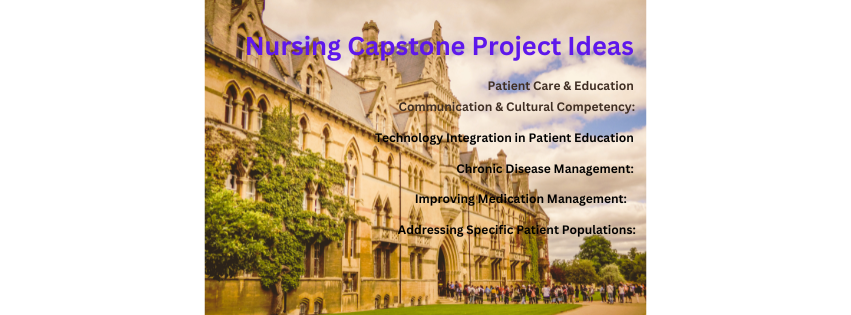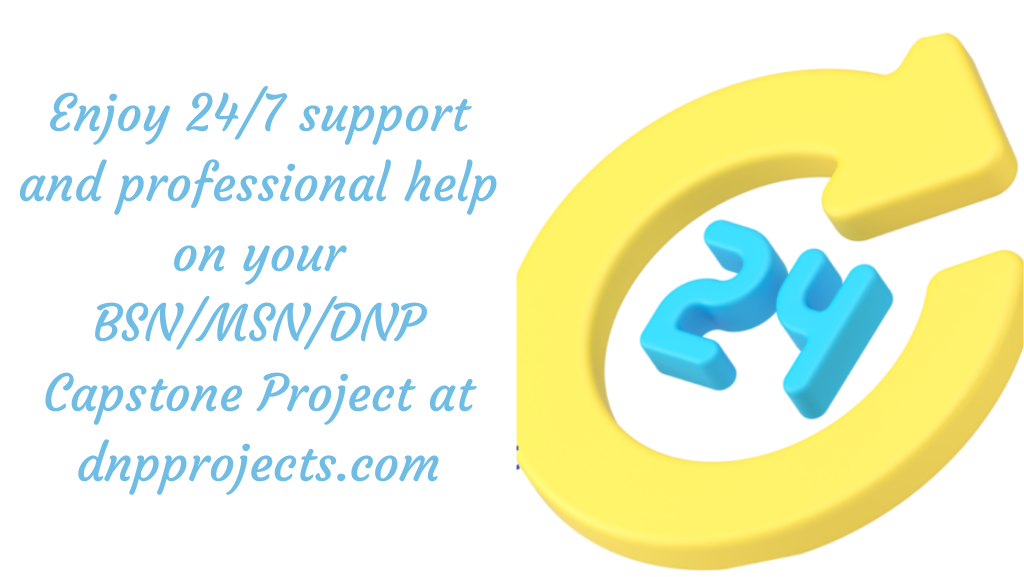I. Introduction
You’re nearing the finish line of your BSN, MSN or DNP program, but there’s one major hurdle left: the capstone project ideas. Excitement mixes with dread as you stare at the blank screen, wondering, “What on earth am I going to do?”
Finding a good capstone project idea can feel like searching for a hidden treasure – exciting, yet potentially frustrating. You know it’s out there, but where do you even begin?
Fear not, we’ve got you covered! This ultimate guide is your one-stop shop for acing those capstone project ideas woes. We’ve compiled a well-researched list of over 220 capstone project ideas across various fields, from nursing including BSN, DNP and MSN specific options. Whether you’re passionate about patient care, educational technology, or sustainable engineering solutions, you’ll find inspiration to complete a project that ignites your interest and showcases your skills.
More than just a list, this guide will equip you with the knowledge to refine your chosen idea, find resources, and navigate the capstone research process. So, grab a cup of coffee, settle in, and get ready to transform your Nursing capstone project from a source of stress into a springboard for success!
What is a Capstone Project Idea?
A capstone project idea is the specific topic or question you choose to explore within your capstone project. It’s the foundation for your research and the driving force behind your project’s development.
Here are some key aspects of a good capstone project idea:
- Alignment with Interests: Choose a topic that sparks your curiosity and aligns with your academic or professional goals.
- Feasibility: Ensure the topic is manageable within the timeframe and resources available for your capstone project.
- Clear Focus: Develop a well-defined research question that guides your project and helps you gather relevant data.
- Real-World Relevance: Seek a topic that addresses a current issue or challenge in your field of study.
- Faculty Approval: Discuss your project idea with your faculty advisor to ensure it aligns with program requirements and receive valuable feedback.
Where to Find Capstone Project Ideas:
- Program Requirements: Your program might have specific guidelines or areas of focus for capstone projects.
- Faculty Advisors: Talk to your professors or advisors who can offer suggestions based on your interests and expertise.
- Industry Trends: Research current issues and challenges within your field and identify areas where your skills and knowledge can contribute solutions.
- Coursework: Review projects or research papers you’ve done throughout your program for inspiration.
- Professional Associations: Many professional associations offer resources and project ideas related to your field.
Choosing the Right Capstone Project Idea:
Don’t feel pressured to pick the “perfect” idea right away. Explore different options, discuss them with your advisor, and consider the following:
- Your Skills and Knowledge: Choose a topic that allows you to showcase your strengths and develop new skills.
- Data Availability: Ensure you have access to the data and resources needed to conduct your research effectively.
- Project Scope: Balance your ambition with practicality – the project should be challenging but achievable within the timeframe.
Remember, a good capstone project idea is the starting point for a rewarding learning experience. Choose a topic that excites you and allows you to contribute something meaningful to your field.
II. Understanding Your Capstone Project Ideas
A. The Capstone: Your Academic Milestone
The capstone project is the epitome of your academic journey. It’s your chance to showcase the knowledge and skills you’ve acquired throughout your program by applying them to a real-world issue or challenge. Think of it as the final test where you get to demonstrate not just your mastery of concepts, but also your ability to think critically, conduct research, and present your findings effectively.
B. Choosing the Perfect Capstone Project Idea: A Strategic Approach
Finding the right capstone project idea is like finding the perfect puzzle piece – it needs to fit your interests, skills, and program requirements. Here are some key factors to consider:
- Fuel Your Passion: What are you truly interested in? Choose a topic that excites you and aligns with your academic goals. For instance, if you are a nursing student passionate about improving patient education, consider developing a project on the effectiveness of interactive tools for medication adherence.
- Leverage Your Skills: Identify your strengths and weaknesses. Choose a project that allows you to utilize your existing skills while also offering opportunities for growth. Example: If you’re a computer science student with strong coding skills, explore projects that involve developing software applications to address a specific need within your field.
- Resource Reality: Be realistic about the resources available to you. Consider factors like data access, equipment needs, and potential funding. Example: An engineering project requiring specialized laboratory equipment might not be feasible if such resources aren’t readily available. Consider alternative projects with more manageable resource requirements.
- Program Alignment: Don’t forget to check your program’s specific requirements for capstone projects. Ensure your chosen topic aligns with your program’s focus and learning objectives.
Brainstorming your capstone project ideas:
Here are some tips to jumpstart your brainstorming:
- Mind Mapping: Visually map out potential topics and their subcategories.
- Seek Inspiration: Talk to professors, industry professionals, or review recent research papers in your field.
- Consider Current Events: Are there any pressing issues or trends in your field that could be explored through a capstone project?
Narrowing Down Your capstone project topics:
Once you have a list of potential capstone project topics, use the following criteria to identify the best fit:
- Feasibility: Can you realistically complete the project within the timeframe and with available resources?
- Impact: Does your project have the potential to make a positive impact, solve a problem, or contribute to new knowledge?
- Personal Interest: Are you genuinely enthusiastic about pursuing this project?
By following these steps and considering these factors, you’ll be well on your way to selecting a capstone project that is both challenging and rewarding.
III. 220+ Capstone Project Ideas to Steer you to Success!

Now that you’re equipped with a strategic approach to choosing a capstone project, let’s explore a wealth of ideas categorized by various fields. With over 220 options, you’re sure to find inspiration that lights your passion and aligns with your academic goals.
A. Nursing: Caring for the Future
Nurses play a vital role in shaping healthcare delivery. Here are some capstone project ideas to showcase your dedication to patient well-being and the advancement of nursing practice:
1. Patient Care & Education:
- Boosting Medication Adherence: Investigate the effectiveness of mobile apps or interactive tools in promoting medication adherence for specific patient populations (e.g., chronic disease management). (Capstone Project Example: Develop and evaluate a medication adherence program tailored to Spanish-speaking diabetic patients.)
- Empowering Patients Through Education: Design and implement educational programs focusing on self-care management for conditions like heart disease or asthma. (Capstone Project Examples: Create a web-based educational module on post-operative pain management for surgical patients.)
2. Communication & Cultural Competency:
- Impact of Language Barriers: Evaluate the effectiveness of using translated educational materials and interpreter services on patient comprehension and adherence to treatment plans.
- Tailoring Communication Styles: Explore how healthcare professionals can adapt communication styles to better engage patients from different cultural backgrounds.
3. Technology Integration in Patient Education:
- Virtual Reality for Pre-Operative Anxiety: Investigate the effectiveness of virtual reality simulations in reducing anxiety for patients undergoing specific procedures.
- Interactive Games for Health Education: Develop a mobile game to promote healthy habits and disease prevention among adolescents.
4. Chronic Disease Management:
- Telehealth Support Groups for Chronic Conditions: Evaluate the benefits of using telehealth platforms to facilitate support groups for patients managing chronic diseases like diabetes or heart failure.
- The Role of Wearable Technology in Self-Monitoring: Explore the potential of wearable technology (e.g., smartwatches, fitness trackers) to empower patients with chronic conditions to actively monitor their health.
5. Improving Medication Management:
- Simplifying Medication Regimens: Analyze the impact of simplifying medication schedules on medication adherence and patient outcomes.
- Medication Take-Back Programs: Evaluate the effectiveness of community-based medication take-back programs in reducing the risk of medication misuse and accidental poisonings.
6. Addressing Specific Patient Populations:
- Pre- and Postnatal Education for New Mothers: Design and implement a comprehensive educational program to support new mothers on breastfeeding, infant care, and postpartum mental health.
- Educational Programs for Geriatric Patients: Develop educational materials tailored to the needs of older adults, focusing on medication management, fall prevention, and healthy aging strategies.
7. Enhancing Patient Engagement:
- Interactive Patient Portals: Explore the impact of interactive patient portals on patient engagement and self-care management.
- Shared Decision-Making Tools: Develop educational tools to facilitate shared decision-making between patients and healthcare providers regarding treatment options.
8. Promoting Preventative Care:
- Community Outreach Programs for Preventative Screenings: Design and evaluate the effectiveness of community outreach programs to encourage preventative screenings for specific health conditions.
- The Role of Social Media in Public Health Education: Analyze the potential of social media platforms for disseminating public health information and promoting healthy behaviors.
9. Healthcare Systems & Management:
- Streamlining Patient Discharge Processes: Analyze current discharge procedures and propose improvements to enhance patient safety and satisfaction. (Capstone Project Examples: Develop a standardized discharge checklist to improve communication and reduce readmission rates.)
- Telehealth: Transforming Healthcare Delivery: Explore the benefits and challenges of implementing telehealth initiatives in specific care settings (e.g., rural communities, home care)
10. Optimizing Hospital Operations:
- Reducing Hospital Readmission Rates: Analyze factors contributing to hospital readmissions and propose evidence-based strategies for reduction.
- Improving Hospital Resource Management: Investigate strategies to optimize resource allocation within hospitals, such as bed management, staffing schedules, and equipment utilization.

11. Enhancing Patient Flow and Efficiency:
- Fast Track Clinics for Minor Emergencies: Evaluate the effectiveness of implementing fast track clinics for minor emergencies within emergency departments.
- Telehealth Triage for Urgent Care Needs: Explore the feasibility and impact of using telehealth platforms for initial triage of patients seeking urgent care.
12. Quality Improvement Initiatives:
- Standardizing Nursing Handoff Procedures: Analyze the impact of standardized nursing handoff procedures on patient safety and communication between healthcare providers.
- Implementing Electronic Health Records (EHR) Systems: Evaluate the challenges and benefits of implementing Electronic Health Records (EHR) systems within healthcare organizations.
13. Healthcare Cost Management:
- The Role of Value-Based Care Models: Investigate the potential of value-based care models in reducing healthcare costs while improving patient outcomes.
- Negotiating Drug Prices with Pharmaceutical Companies: Analyze strategies for healthcare institutions to negotiate lower drug prices with pharmaceutical companies.
14. Addressing Workforce Challenges:
- Nurse Staffing Ratios and Patient Outcomes: Explore the relationship between nurse staffing ratios and patient outcomes in different healthcare settings.
- Strategies for Reducing Nurse Burnout: Investigate effective strategies to address nurse burnout and promote staff retention within healthcare organizations.
15. Public Health Policy and Systems:
- The Impact of Public Health Insurance Programs: Analyze the accessibility, affordability, and effectiveness of public health insurance programs in a specific region.
- Telehealth Policy and Reimbursement Models: Explore policy considerations and reimbursement models for telehealth services in different healthcare settings.
16. Healthcare Delivery in Rural Communities:
- Mobile Clinics for Underserved Populations: Evaluate the effectiveness of mobile clinics in providing healthcare services to underserved populations in rural areas.
- Telehealth Solutions for Rural Mental Health Care: Investigate the feasibility and impact of using telehealth platforms to expand access to mental health care services in rural communities.
17. Healthcare Data Analytics:
- Predictive Analytics for Disease Management: Explore the use of healthcare data analytics to predict potential health risks and implement preventive measures.
- Improving Patient Risk Stratification: Analyze the use of data analytics to develop more accurate patient risk stratification models for resource allocation and treatment planning.
18. Nursing Leadership & Advocacy:
- Mentoring the Next Generation: Develop a mentorship program to support and empower new nurses transitioning into the workforce. (Capstone Project Example: Design a peer-mentorship program connecting experienced nurses with newly graduated nurses in a specific clinical area.)
- Championing Change: Advocating for Policy Improvements: Investigate a current healthcare policy that impacts nursing practice and propose evidence-based recommendations for positive change. (Capstone Project Examples: Advocate for policy changes to increase nurse staffing ratios in intensive care units to improve patient outcomes.)
19. Mentorship and Professional Development:
- Developing Nurse Residency Programs: Design and evaluate the effectiveness of nurse residency programs in improving retention and skill development for new nurses.
- Leadership Training Programs for Nurses: Investigate the impact of leadership training programs on the career advancement and management skills of nurses.
20. Advocacy for Nursing Practice:
- The Role of Nurses in Hospital Committees: Analyze the barriers and facilitators for nurses’ participation in hospital committees and propose strategies for increased involvement.
- Workplace Violence Against Nurses: Explore the prevalence and impact of workplace violence against nurses and advocate for effective prevention strategies.
21. Optimizing Nurse Staffing and Work Schedules:
- The Impact of Mandatory Overtime on Nurse Burnout: Analyze the relationship between mandatory overtime and nurse burnout rates, advocating for policies that promote safe staffing levels.
- Flexible Work Arrangements for Nurses: Investigate the benefits and challenges of implementing flexible work arrangements (e.g., part-time schedules) for nurses.
22. Promoting Patient Advocacy:
- Empowering Patients to Ask Questions and Participate in Care Decisions: Develop educational resources and training programs to enhance patient advocacy skills during their healthcare experiences.
- Nurses as Patient Advocates for Vulnerable Populations: Explore the role of nurses in advocating for the rights and needs of vulnerable patient populations (e.g., children, elderly, patients with disabilities).
23. Nursing Collaboration and Interprofessional Communication:
- Strategies for Improving Communication Between Nurses and Physicians: Investigate strategies to enhance communication and collaboration between nurses and physicians in different healthcare settings.
- The Role of Nurses in Interprofessional Teams: Analyze the impact of nurses’ active participation in interprofessional teams on patient care coordination and quality improvement.
24. Nursing Workforce Diversity and Inclusion:
- Strategies for Recruitment and Retention of Diverse Nurses: Develop strategies to attract and retain nurses from underrepresented racial and ethnic minorities within the nursing workforce.
- Promoting Inclusive Work Environments for Nurses: Investigate strategies to create inclusive work environments within healthcare organizations that foster respect and value diversity among nurses.
25. Public Health Nursing and Community Advocacy:
- The Role of Nurses in Public Health Education Initiatives: Explore the effectiveness of nurse-led public health education campaigns focused on specific health issues (e.g., disease prevention, immunizations).
- Advocacy for Community Health Resources: Investigate the lack of access to healthcare resources in specific communities and advocate for policies to address these disparities.
26. Advanced Practice Nursing (APN) Leadership:
- The Impact of APNs on Patient Care Outcomes: Analyze the impact of Advanced Practice Nurses (APNs) on patient care outcomes in specific healthcare settings (e.g., primary care, chronic disease management).
- Expanding the Scope of Practice for APNs: Explore policy considerations and potential benefits of expanding the scope of practice for Advanced Practice Nurses.
27. Specialization-Specific Capstone Project Ideas:
These are just a few capstone research examples – tailor your project to your specific area of interest within nursing, such as:
- Pediatric Nursing: Develop a pain management program for children undergoing specific procedures.
- Mental Health Nursing: Explore the effectiveness of mindfulness-based interventions for managing anxiety in patients.
- Wound Care: Evaluate the efficacy of new wound management dressings for pressure ulcers.
Pediatric Nursing:
- Music Therapy for Reducing Procedural Pain in Infants.
- Effectiveness of Educational Games for Pre-Operative Anxiety in Children.
- Developing a Parent Support Group for Children with Chronic Illnesses.
- The Impact of Storytelling Interventions on Pain Management in Burn Patients.
- Telehealth Platforms for Post-Discharge Follow-up Care for Children with Respiratory Conditions.
Mental Health Nursing:
- Art Therapy as a Tool for Managing Depression in Adolescents.
- Group Therapy for Substance Abuse Recovery in Young Adults.
- The Effectiveness of Cognitive-Behavioral Therapy (CBT) for Anxiety Disorders in Older Adults.
- Developing a Culturally Sensitive Approach to Mental Health Assessment for Refugee Populations.
- Telehealth Interventions for Improving Access to Mental Health Services in Rural Communities.
Wound Care:
- Comparative Effectiveness of Different Wound Debridement Techniques.
- The Impact of Nutritional Interventions on Pressure Ulcer Healing Rates.
- Developing Educational Materials for Diabetic Foot Care to Prevent Amputations.
- Evaluating the Cost-Effectiveness of Negative Pressure Wound Therapy (NPWT) in Specific Cases.
- Telemonitoring Systems for Early Detection of Pressure Ulcer Development in High-Risk Patients.
Critical Care Nursing:
- The Use of Simulation Training to Improve Communication and Teamwork in the ICU.
- The Impact of Music Therapy on Delirium in Mechanically Ventilated Patients.
- Evaluating the Effectiveness of Pain Management Protocols for Critically Ill Patients.
- Developing a Family Support Program for Patients and Families in the ICU.
- Investigating the Feasibility of Implementing Tele-ICU Follow-up for Post-Discharge Care.
An important aspect of BSN capstone projects is focusing on evidence-based practice and applying the knowledge and skills acquired throughout the nursing program to a specific issue or challenge.
Here’s a breakdown of how the previous ideas can be applied to BSN capstone projects:
- Patient Care & Education: These ideas directly translate to BSN capstone projects as they focus on improving patient outcomes through education and evidence-based interventions.
- Healthcare Systems & Management: BSN capstone projects can explore ways to optimize healthcare delivery within specific settings, considering factors like patient flow, resource management, and quality improvement initiatives.
- Nursing Leadership & Advocacy: BSN students can develop projects that promote nursing leadership within healthcare teams, advocate for policy changes to improve patient care, or address workforce challenges.
- Specialization-Specific Ideas: These ideas are particularly relevant for BSN students focusing on a specific area of nursing practice (e.g., pediatrics, mental health, wound care). They can delve deeper into evidence-based practices within their chosen specialization.
Here are some additional tips for tailoring the BSN capstone project ideas:
- Focus on Feasibility: Ensure your chosen project is achievable within the timeframe and resources available for BSN capstone projects.
- Data Collection: Consider the type of data collection methods (e.g., surveys, interviews, chart reviews) that are feasible and relevant to your research question.
- Faculty Guidance: Discuss your project ideas with your faculty advisor to ensure they align with BSN program requirements and receive valuable feedback on feasibility and research methods.
This is just a glimpse into the vast array of possibilities within the nursing field. Remember, these are just starting points. Feel free to get creative and explore topics that resonate with your personal goals and interests within the nursing profession.

IV. Transforming your Idea into a Capstone Project
Having a project idea is fantastic! Now, let’s equip you with the tools to transform it into a stellar capstone project.
A. Sharpening Your Focus: Refining Your Idea
Before diving headfirst into research, take some time to refine your project idea. Here’s how:
- Craft Compelling Research Questions: Develop clear, concise research questions that guide your project and ensure its feasibility.
- Choose Your Methodology: Identify the research methods you’ll use to gather and analyze data (e.g., surveys, interviews, case studies).
- Secure a Faculty Advisor: Connect with a faculty member with expertise in your chosen area. Their guidance will be invaluable throughout the project.
B. Resources at Your Fingertips:
Don’t feel like you’re on a solo mission! Here are some valuable resources to support your capstone project journey:
- University Libraries: Librarians are experts at helping students find relevant research materials and databases. (Capstone Research Example Database: Many libraries offer access to databases specifically focused on capstone research projects across various disciplines.)
- Academic Writing Centers: Sharpen your writing skills and ensure your project adheres to academic formatting standards.
- Online Resources: A wealth of online resources can provide valuable information, including:
- Professional Associations in Your Field – Many professional associations offer research tools and resources specific to your discipline.
- Government Websites – Government websites often provide data and statistics relevant to your research topic.
- University Websites – Explore websites of other universities for capstone project resources and examples (mention keyword: capstone research examples).
C. The Finish Line is in Sight!
This comprehensive guide has equipped you with over 220 project ideas, a strategic approach to choosing the right one, and valuable resources to support your research and writing. Remember, your capstone project is a chance to showcase your intellectual curiosity, research skills, and ability to solve real-world problems.
Don’t hesitate to take action! Use the provided resources, consult with your faculty advisor, and embark on a journey of discovery that will not only fulfill your program requirements but also propel you forward in your academic and professional career.
FAQs for Capstone Project Ideas
I’m stuck! Where do I even begin to find a good capstone project idea?
There’s no pressure to find the “perfect” idea right away. Here are some starting points:
At dnpprojects.com, we offer tailored support every step of the way to ensure your capstone project is a success.
Review program requirements: Your program might suggest specific areas of focus for capstone projects.
Talk to your advisor: Faculty advisors can offer personalized suggestions based on your interests and expertise.
Explore industry trends: Research current challenges and issues in your field – is there a gap you can address?
Look back at coursework: Review projects or research papers you’ve done throughout your program for inspiration.
Browse professional resources: Many professional associations offer capstone project ideas and resources related to your field.
How important is it for my idea to be unique?
While uniqueness is a plus, a strong and well-researched project based on an existing topic can be just as valuable. Focus on finding an angle that allows you to add your own perspective or contribute new insights.
What makes a good capstone project idea?
Look for these qualities:
Interest: Choose a topic that excites you and aligns with your academic or professional goals.
Feasibility: Ensure it’s manageable within your timeframe and resource limitations.
Clear Focus: Develop a well-defined research question that guides your project.
Real-World Relevance: Address a current issue or challenge in your field.
Faculty Approval: Discuss your idea with your advisor to ensure it aligns with program requirements.
What if I don’t have access to a lot of data?
You can always contact us for help at dnpprojects.com. We have experienced data analysis experts to handle this type of tasks.
Is it okay to change my capstone project idea after I’ve started?
Yes, it’s perfectly acceptable, especially if your initial research reveals limitations or a more compelling topic emerges. Discuss any changes with your advisor to ensure a smooth transition and inform us. Our support team is always available to discuss any changes. However, this is likely to attract additional changes as agreed with the support.






